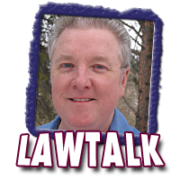LAW TALK
To answer your questions, it’s probably important to know a little bit about how copyright to a musical piece works. When an individual writes a song, he obtains what courts call a “bundle of rights” known as copyright. These include the exclusive right to perform the song. While this may be the case, the problem has always been (and continues to be), how to enforce that right?
In the early 20th century, a group of songwriters and music publishers, including Irving Berlin and Ira Gershwin, established an organization whose sole purpose was to police the market place and require persons to obtain licenses in order to perform works which were subject to the public performance right of copyright. That organization was and is ASCAP. This organization is known in the industry as a “performing rights society.” While there are other performing rights organizations throughout the United States and the world (BMI and SESAC come to mind), ASCAP was the original organization.
Performing rights organizations use a variety of methods in order to ensure that their members get paid for the performance of their copyrighted works. Examples include audits of radio station playlists and, in your case, requiring so-called “blanket” licenses from venue owners to allow the performance of copyrighted works.
For the owner of a venue, the “blanket license” ensures that the owner will not be sued for infringement if a band booked at the venue performs a copyrighted musical work. While, of course, the owner of the venue can place that onus on the musical group, i.e., requiring them to receive permission from the copyright owner to perform the music they are performing at the venue and paying them a direct license for that right, it is simply prudent for the venue owner to obtain a license from each of the major performing rights societies.
Not all performances of musical works in a venue require a “blanket license.” For instance, use of a radio in a venue where the music was not “piped in” for the benefit of the customers of the venue may, in certain cases, be considered not to be a breach of the performance right. However, courts have by no means been clear about the extent to which one can take this approach. For example, where a beauty salon hooked up a radio to speakers that were built into the salon and piped music from a radio station throughout the salon, the court held this to be an infringing use of the copyrighted work. Hence, as the state of the law is very fact specific, you should obtain legal advice before trying to circumvent the blanket license issue.
In a live venue, there’s not much chance that you will be able to escape getting a blanket license. Nor is that necessarily a bad thing. In many instances, a songwriter’s check from ASCAP may be the most significant amount of money they will make on their copyrighted work, far greater than record royalties. Hence, by paying the license fees, you are assisting songwriters in making a living in their trade.
The downside (besides paying the money in the first place) is that “niche” musical styles not frequently heard on the radio simply do not get paid anywhere near as much as pop writers do. That certainly describes most folk and traditional music writers today. While that is a problem that needs correction, it does not justify performing another’s work in a commercial setting without paying them for it. I would recommend that you budget performing rights licenses (for the three major companies, ASCAP, BMI and SESAC) on a yearly basis as a cost of doing business. It will cost you far less to do so than paying an attorney to defend you in an infringement lawsuit.













